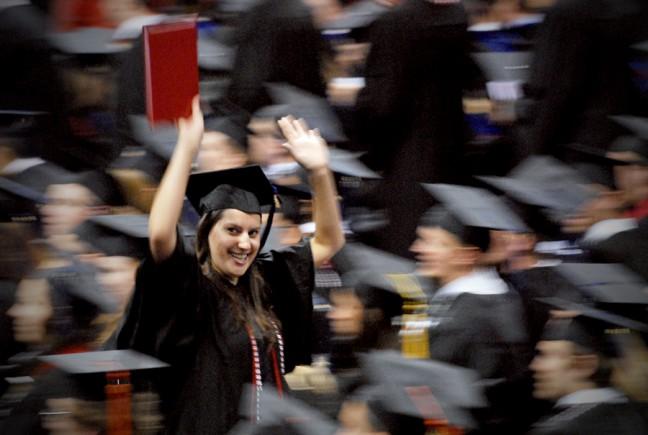While University of Wisconsin’s graduation rates have steadily improved in past years, this trend could be reversed under proposed budget cuts if class offerings are reduced.
Despite the progress UW made during the past two decades on making sure students graduate in four year, experts argue budget cuts would almost certainly derail future gains.
Noel Radomski, director of the Wisconsin Center for the Advancement of Postsecondary Education, said there is a high probability that there may be fewer class sections due to cuts. He said this would prevent students from enrolling in the courses they need, leading to greater time necessary to earn a degree.
UW’s graduation rates have been on a steady upswing and are the highest they have ever been, Wren Singer, director for undergraduate advising at UW, said.
According to the UW Data Digest, 57 percent of undergraduate students graduated in four years in 2010, an increase from only 41.2 percent in 1996.
Radomski said part of the reason for the steady increase in graduation rates stemmed from the realization in the 1980s and 1990s that UW System schools’ graduation rates were low compared to private institutions. University officials then pushed to reduce degree requirements, he said.
However, despite seeing improvements in these rates, Singer said challenges remain to combat a university culture in which graduating on time is not pushed as hard at public universities as it is in private ones.
“I think it’s a pretty strong expectation at a private institution that you finish in four years,” Singer said. “I think a lot of it is a culture, an expectation that this is what you do, and we don’t have that culture here at UW.”
At Northwestern University, a private institution, 93 percent of students graduated in five years – four year data is unavailable – while in the same year at UW only 80.7 percent graduated.
Still, Singer acknowledged many other factors contributing to high graduation rates at these institutions. She said students at these private universities often are wealthy and have received top-notch secondary education.
Singer also admitted that higher tuition at private institutions might serve as an incentive to graduate earlier. Even among out-of-state students at UW who pay more in tuition, graduation rates are higher.
In 2010, 60.4 percent of out-of-state students graduated in four years, while only 54.7 percent of their in-state counterparts did, according to university data.
Additionally, Radomski said factors such as admissions standards play a role in graduation rates. He said rates at institutions like UW-Madison are often higher than other UW System schools because students at the flagship campus are more academically prepared.
Singer said the university is committed to improving the four-year graduation rate because, contrary to popular thought, the university does not have any financial incentive to keep students here longer. She said higher graduation rates improve the university’s ability to admit new students.
To improve current graduation rates, Singer said in addition to strengthening students’ relationship with advisors, one of the most compelling solutions is setting a bigger expectation among students to graduate early.
“I think the main strategy that students would notice is more discussion about it, more emphasis on it at SOAR and other different points in other times we have contact with students,” Singer said.














